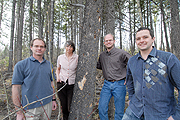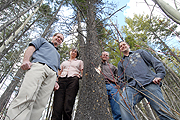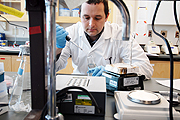Pine Beetle Study Leads to Bioenergy Research
Media Release
June 29, 2009
| An ongoing multi-institutional project studying the mountain pine beetle is yielding results that promise to contribute to more strategic investments in bioenergy. Researchers at UNBC, UBC, the University of Alberta, the Natural Resources Canada Canadian Forest Service, and the Genome Sciences Centre in Vancouver are studying the beetle, its relationship to the pine trees it attacks and the fungal pathogens that help the insect overcome a tree’s natural defenses. The goal of the work is a better understanding of how to predict the location of potential supplies of bioenergy. Conifer forests are Canada’s largest renewable source of ligno-cellulose, used for energy production, pulp and paper, and wood products. Understanding the biology of the mountain pine beetle, its host, and fungi should contribute to predictive models that better anticipate the spread of the infestation and future outbreaks. Better predictive models will help to guide control measures and will be an important contribution to a more stable supply of bioenergy products. “Massive amounts of dead timber from the mountain pine beetle epidemic are a potential energy feedstock, but this won’t necessarily provide a sustainable supply in the future,” says Canadian Forest Service Researcher Brian Aukema, who works at UNBC. "Improving current methods of predicting feedstock will help us make more focused investments in the forest industry." Along with his colleagues at the other institutions, Dr. Aukema is coordinating with UNBC professors Brent Murray, Dezene Huber and Kathy Lewis. Dr. Huber’s laboratory is working on the beetle’s tolerance to the cold and ability to detoxify a tree’s natural defenses, Dr. Lewis is investigating the shelf life of beetle killed-trees (how long the wood can be used and for what purpose) while Drs. Aukema and Murray are studying population genomics, predictive modeling, and genomic landscape maps. The ability of the pine beetle to withstand Northern BC’s frigid temperatures is one of the factors under investigation at UNBC. “Our DNA sequencing efforts have provided us with the sequences of genes that are likely related to the production of the beetle’s ‘antifreeze’ glycerol,” says Dr. Huber. “We’re now working on what turns those genes on and off in the autumn and spring, with the hope of better understanding the climatic variables that impact insect overwintering success.” Thus far, the researchers have collected tens of thousands of beetle and larvae samples and employed several student researchers and technicians. That current project (www.thetriaproject.ca), with a budget of nearly $4 million spread across the collaborating institutions, has been foundational to the work. The new Applied Genomics Research in Bioproducts or Crops project that will build on the current work, amounts to nearly $8 million, and is being funded by Genome Canada, Genome BC, and Genome Alberta. The newly funded work will commence in January of 2010. Genome Canada is a not-for-profit organization with mandate to develop and implement strategies for supporting large-scale genomics and proteomics research projects in Canada. |
Media Downloads Clickon a thumbnail below to access a high-resolution image of UNBC professors Dezene Huber, Brian Aukema, Kathy Lewis, and Brent Murray. From left to right: Brent Murray, Kathy Lewis, Brian Aukema, and Dezene Huber.
|
Contact:
Michael Kellett, Communications Officer, UNBC - 250.960.5621
Dr. Dezene Huber, Ecosystem Science and Management. UNBC - 250.960.5119



